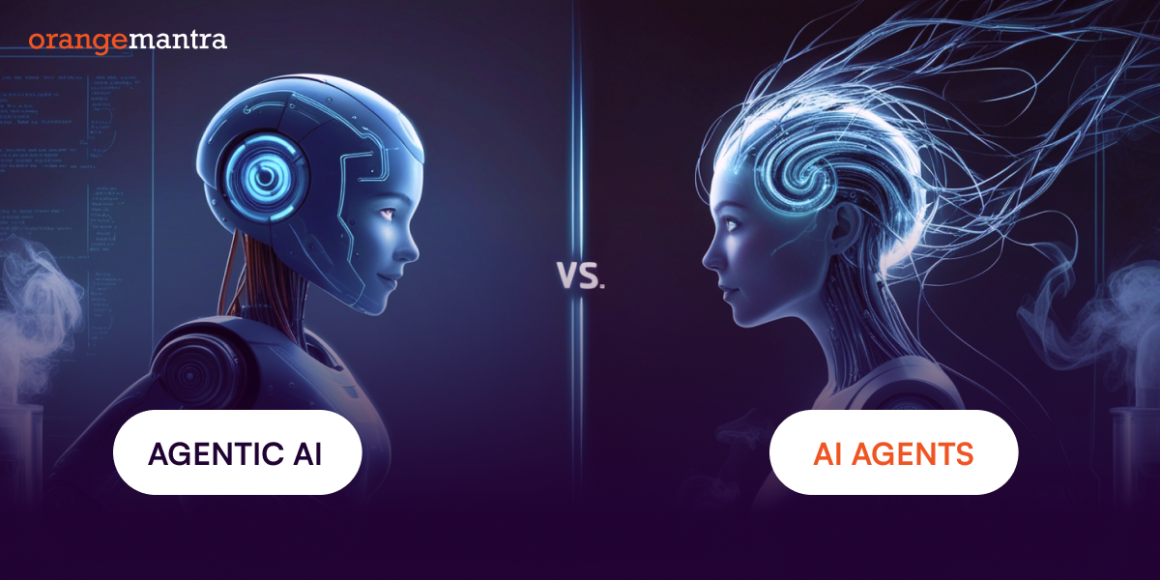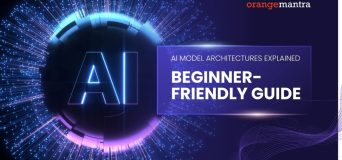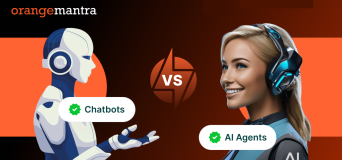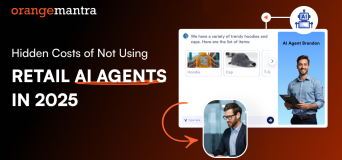Business operations have revolutionized, and it would not have been possible without AI agents. Although these agents in AI are a vast term, and they have many types. We see the prevalence of agentic AI and AI agents that have a big impact on how businesses work. But learning about these two and their differences you will be able to know when to apply them.
So, the debate between the two continues understanding their differences helps you know when to apply each. In the world of AI, an AI agent development company is your partner in creating custom AI agents that are perfectly tailored to your business needs. Because when it comes to AI, one size doesn’t fit all!
Table of Contents
What is an agent in AI?
Getting to know both can help you figure out which one’s the perfect match for your business. Firstly, let’s begin with AI agent and why it is important to know.
These software systems are designed to perform very specific tasks in a manner that mimics intelligence. This includes processing data, making decisions, and interacting with the environment (or users). They are goal oriented and are task specific programmed with rules and algorithms that help to achieve goals.
As I mentioned about AI agents doing specific tasks, they are answering questions, organizing your calendar, or data entry automation. Overall, these Ai agents automate entire workflow processes. Mostly suited for simpler, repetitive tasks like chatbots, virtual Assistants, recommendation systems, email sorting tools.
They leverage task specific capabilities, knowledge and memory to validate and improve their own output and even of other agents in the system.
What is Agentic AI ?
Now moving forward with agentic AI. Well, they go a step further and are regarded as highly autonomous. They can take care of complex tasks as they are typically sophisticated because of their capability of perception and reasoning with which they can take decisions autonomously. Even better, they can adapt to changes as they keep on learning and improving over time with experience and feedback.
Language models can be considered Agentic AI in the broader sense of autonomous decision-making and response generation, but they don’t exhibit all the characteristics of a fully autonomous agent (like real-time learning or physical actions).
OpenAI GPT (e.g., ChatGPT), Google BERT, and DeepMind’s Language Models, they understand the data that they have been trained on.
Agentic AI vs AI Agents: For Intelligent Business Solutions
Let’s explore how agentic AI business impact can optimize processes, enhance customer experiences, and accelerate growth.
| Aspect | Agentic AI | AI Agents |
| Autonomy | Highly autonomous; can make independent decisions | Limited autonomy due to predefined rules and algorithms. |
|
Learning Capability |
Continuously learns and adapts from experience and feedback
|
Typically, it does not learn or adapt in real-time; performance is based on initial programming. |
|
Use Cases |
– Autonomous decision-making
– Advanced analytics – Self-improving systems – AI-driven strategy and planning |
– Task automation (e.g., data entry, email sorting)
– Customer support (e.g., chatbots) – Workflow automation – Personal assistants (e.g., scheduling) |
|
Complexity |
More complex; requires advanced infrastructure and may involve integration with other systems (e.g., IoT, machine learning platforms). |
Relatively simpler and easier to implement in isolated use cases. |
| Scalability | Highly scalable; can handle increasingly complex tasks as more data is processed and systems evolve. |
Scalable within a specific scope but may require more manual intervention when tasks grow in complexity. |
|
Cost Efficiency |
Can provide long-term cost savings through automation, continuous optimization, and fewer errors. |
Offers short-term cost savings through automation but may not provide as much long-term value compared to agentic systems. |
Powerful Solutions with Agentic AI Tools
As mentioned earlier agentic AI handles all complex solutions and there are certain tools that help in doing so, enabling autonomous decision-making, continuous learning, and adaptive intelligence. Let’s dive deeper.
OpenAI GPT (e.g., GPT-4)
A powerful language model helping businesses in content creation, customer support, and other tasks that require natural language processing.
Microsoft Azure AI
Consists of a powerful set of AI tools for developing machine learning models, natural language processing, and intelligent applications. This helps in creating adaptive AI systems.
Google Cloud AI
It has a suite of machine learning and AI tools that is capable of developing, deploying and scale AI models. Used in image recognition, language understanding, and translation.
Amazon SageMaker (AWS)
This is a fully managed service from AWS that provides tools for building, training, and deploying machine learning models. It even includes built-in algorithms for common ML tasks that are helpful for faster model development.
Agentic AI in Business
- AI driven tools handle all tasks that boost efficiency where chatbots and automated virtual assistants are deployed to handle common queries, providing responses instantly, around the clock. Forget the days of endless hours spent answering emails or responding to routine questions.
- Want to cut costs? You can very easily do so with the use of AI powered automation tools. AI-driven platforms that automate email marketing, social media management, and content generation. So, you can spend your resources elsewhere.
- Autonomous AI chatbots have become the backbone of customer service and offer personalized recommendations. Another key advantage of Agentic AI in customer service is the ability to offer round-the-clock assistance.
- Agentic AI lets businesses stay ahead of the curve and you can quickly adjust to market changes or customer demands. For inventory management, these agents can optimize pricing, or fine-tuning. AI agents let you stay in sync with the changing market demands.
Challenges of Implementing Agentic AI
Agentic AI promises growth, but businesses must overcome some challenges to implement it smoothly.
- AI integration requires technical know-how as it is not just simply isn’t exactly plug-and-play. You can expect a learning curve, especially when aligning AI with existing processes and infrastructure.
- Consider financial investment, if you can afford the key! The upfront cost of AI technology includes training, support, and maintenance. This will cost a lot. It’s an investment, but like any good investment, the returns can be huge—eventually.
- It can shake things up as well as increase efficiency. Some employees might fear their jobs are on the line with the adoption of AI agents. Change management is indeed very crucial and employees are trying to navigate through the cultural shift.
Implementing Agentic AI
Customer Service
If you’re looking to elevate your customer service, AI-powered chatbots and virtual assistants are your best friends. These tools handle routine inquiries 24/7
Sales
For sales teams, predictive AI tools are helpful to analyze past customer data. AI can identify highly probable leads and help your sales team focus efforts on prospects most likely to convert. It’s like having a crystal ball for sales success!
Supply Chain Management
AI can work wonders in optimizing your supply chain. From inventory management to demand forecasting and logistics. So, no more guessing games as AI ensures your supply chain runs smoothly.
Marketing
Marketing is now getting personal. With AI-driven tools, you can segment your customers and deliver hyper-targeted campaigns tailored to individual needs. These tools help boost engagement and ROI, ensuring your marketing dollars are spent wisely.
Multimodal AI Enhancing AI Agent Decision-Making!
Think of multimodal AI as the upgrade pack for AI agents and Agentic AI as it lets them mix and match data types like text, images, and sound. AI agents use it for smarter tasks, while Agentic AI takes it further with autonomous, adaptable decision-making.
Multimodal AI empowers AI agents as they are equipped to handle and process a wider variety of data types. These systems can process and integrate multiple types of data, such as text, images, audio, and video, to enhance understanding and decision-making. They play a crucial role by enabling agents to process diverse information sources. With the support of AI agent development services, they can process diverse information sources, improving their ability to understand complex environments.
Here’s how it works
Data Fusion: In this, they combine inputs from various sources, allowing the agent to extract relevant features from each data type.
Cross-Modal Understanding: The system can link and correlate information from different modalities. It might use the context from text to better interpret images or videos, or match speech with visual cues.
Improved Contextual Awareness: By processing multiple data streams simultaneously, AI agents gain a more holistic understanding of the environment.
Learning from Diverse Inputs: These agents learn from a variety of data sources, making them adaptable to various situations—whether they’re diagnosing a medical condition or recommending content.
In conclusion, as the debate continues about Agentic AI vs AI agents, it’s important to note that they play vital roles as they serve distinct purposes. When businesses are deciding between the two, it’s all about the level of autonomy and complexity they need. AI agents are great for specific tasks like automating customer support or recommending products. Thus, they follow predefined rules and react to inputs within set boundaries.
On the other hand, if a business needs a system that can set its own goals, adapt to changing environments, and make decisions with minimal human intervention, agentic AI is the way to go. So, if you’re looking for a more hands-off, adaptive AI agent development solution that can evolve, agentic AI might be your best bet; if you need something that sticks to a specific task, AI agents will do the job just fine.
FAQS
Q1. What’s the difference between Agentic AI and AI Agents?
Agentic AI operates autonomously, making decisions based on specific goals. AI agents are task-specific tools (like chatbots) that assist with specific tasks but may not be fully autonomous.
Q2. How do they impact business operations?
Agentic AI streamlines entire processes and decision-making. AI agents automate routine tasks like customer queries, improving efficiency but with less autonomy.
Q3. Can Agentic AI replace human workers?
Agentic AI enhances tasks but doesn’t replace humans. It automates repetitive processes, letting employees focus on more complex tasks.
Q4.Are there ethical concerns with both?
Yes, both raise concerns about transparency and accountability in decision-making, especially in sensitive industries.
Q5. Which industries benefit most?
Agentic AI excels in industries needing complex decision-making (finance, healthcare). AI agents shine in customer service, sales, and marketing.





